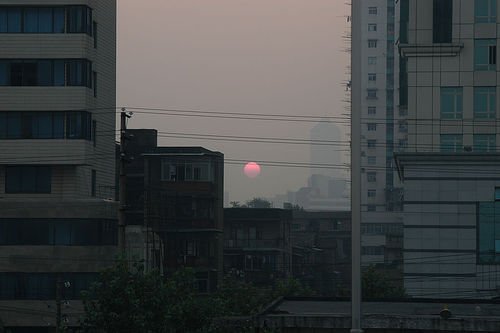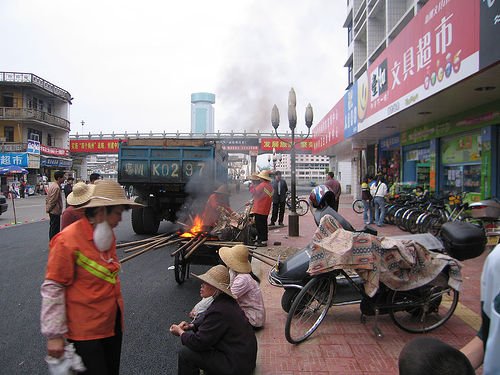
How the world’s priorities have changed over China: not so long ago the US Congress was earnestly debating China’s human-rights record. Today all anyone cares about is that China’s economic wheels keep turning, so it goes on filling its shelves with our goods. Far from worrying about China’s repressive regime, foreign politicians are mainly concerned that it keep a lid on the discontent caused by widespread official corruption. That’s why the outside world got a graphic glimpse of the rioting recently in Hunan last week. The crackdown on the 20,000 or so demonstrators was incredibly vicious, yet remarkably, a BBC TV reporter was allowed to film it. You can be sure that was no accident. Hu Jintao’s regime is the most media savvy in China’s history: it wanted to show the world that, fine words about justice aside, it has the situation well under control, even if it means sending in a couple of thousand baton-wielding troops and declaring martial law.
It’s a pity China wasn’t as tough on curbing the terrible price exacted by the steep economic growth. Once sleepy rural towns are now boxed in by factories and power plants belch acrid smoke. Even with a face mask it’s hard to breathe when you go outside. The sky is black - cars always drive with their headlights on; the soil is chemically contaminated (vegetables that grow there are covered with ugly black patches); and people are getting sick from skin infections, breathing disorders and cancers. Drinking water is the biggest worry: 90% of China’s water is now seriously polluted.
Europeans also make things worse by sending China all their supermarket packaging and plastic bags. Britain alone dumps around two million tonnes of waste in China every year. What can’t be recycled is melted down in acid baths, or burned, creating noxious fumes and appalling health problems for the locals.
 However, China’s main problem is that most of its growth is fuelled by coal. Within a few months, its emission of greenhouse gases will exceed that of America: in 25 years, if left unchecked, it will be twice that of all developed nations put together. Yet China’s leaders remain reluctant to take any steps to stem it, fearing that to curb growth would be to invite social unrest which is crazy since pollution itself is now a prime cause of public anger. Two years ago, there was rioting when four million people had their water cut off following a chemical spill in the Songhua River. Other such accidents, albeit on a lesser scale, occur every other day, and it’s local politicians and businessmen, putting careers and profits before environmental safety, who are blamed for them.
However, China’s main problem is that most of its growth is fuelled by coal. Within a few months, its emission of greenhouse gases will exceed that of America: in 25 years, if left unchecked, it will be twice that of all developed nations put together. Yet China’s leaders remain reluctant to take any steps to stem it, fearing that to curb growth would be to invite social unrest which is crazy since pollution itself is now a prime cause of public anger. Two years ago, there was rioting when four million people had their water cut off following a chemical spill in the Songhua River. Other such accidents, albeit on a lesser scale, occur every other day, and it’s local politicians and businessmen, putting careers and profits before environmental safety, who are blamed for them.
Chinas leaders used to blame the West for global warming, pointing out China has contributed less than 8% of CO2 emissions since 1850. But now they’ve signalled that they’re ready to engage in international negotiations on global warming. Beijing might well commit itself to binding caps on emissions (thereby robbing the US of its key excuse for not doing likewise). Better still, it aims to raise energy efficiency by 20% in four years - mainly by greater reliance on renewable sources and cut-backs in iron and steel production. This is ambitious as these targets far exceed those set by Western countries. Still, there’s an encouraging precedent. In the Sixties, Tokyo and Osaka were as polluted as China’s cities are now, but thanks to tough policies, Japan is now more energy-efficient than any other country. Let’s hope, for the world’s sake, that its neighbour can pull off the same trick.
Δεν υπάρχουν σχόλια:
Δημοσίευση σχολίου